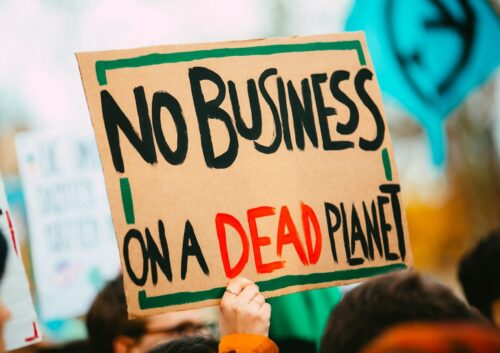
The biggest bank in the Netherlands is being sued for not taking strong enough action to tackle climate change, it was told on Friday, as corporate environmental strategies increasingly become a hotbed for legal action. [emphasis, links added]
ING joins a list of companies and other organizations that have been sued for not doing enough to tackle climate change in Europe and the U.K.
On the flip side, companies and nonprofits in the U.S. have been sued for focusing too aggressively on commitments to combat climate change, with some facing costly pushback in courts.
The bank, which is being sued by Dutch environmental group Milieudefensie [translation: Environmental Defense], has been one of the biggest players in the financing of commodities projects, including those related to fossil fuels. ‘
Milieudefensie says that as ING is one of the world’s largest banks, it bears responsibility for the impact its investments have on the climate.
ING said that Milieudefensie’s claims were “unrealistic and unreasonable,” adding that it was confident in its climate approach. “We share the concern about the climate but differ in opinion on what action that requires,” it said in a statement.
The suit follows a trial in the Netherlands in 2021 that found oil giant Shell has a responsibility to combat climate change. That litigation was also brought by Milieudefensie.
Last year, a court of appeals ruled that while Shell is obliged to reduce its emissions, the court was unable to determine which percentage should apply and rejected Milieudefensie’s claims.
“Climate change is a direct threat to human rights, and the court has ruled that companies such as ING must take accountability for reducing their emissions,” said Donald Pols, chief executive of Milieudefensie, which is the Dutch wing of environmental group Friends of the Earth.
“ING must align its climate policies with the Paris Climate Agreement to do their part and help secure a sustainable future.”
For ING, a ruling isn’t expected until next year, but if the case against the Dutch bank is successful, it could open the doors to further legal action in Europe against fossil fuel companies and the corporate actors that work with them, such as banks and asset managers.
This is in contrast to the situation in the U.S., where banks and asset managers have been taken to court for being too intensely focused on making green investments, and environmental nonprofits have been thrust into expensive legal battles.
This month, the U.S. fossil-fuel industry secured a victory over environmental charity Greenpeace, which was ordered to pay hundreds of millions of dollars to an oil pipeline company after a jury found the charity liable for defamation and trespassing. Greenpeace has said it will appeal the decision.
In December, Texas Attorney General Ken Paxton said BlackRock and other asset managers were avoiding their fiduciary duty to shareholders by making climate-focused investments instead of investing in markets such as coal in their search for profitable returns.
In the U.S. regulatory sphere, the Securities and Exchange Commission paused its defense of proposed climate-disclosure rules under which large companies would report on their emissions, similar to regulations adopted in Europe and California.
The SEC faced lawsuits saying the proposed rules were arbitrary and capricious and violated the First Amendment.
With lawsuits under way on both sides of the Atlantic, companies and charities that operate in both jurisdictions are being put in a bind.
In the U.S., being sued for taking action on climate [change] is becoming more likely, especially amid a Trump presidency. In Europe, litigation working in the opposite way is equally likely.
For many companies, the answer at the moment appears to be to keep their heads below the parapet to avoid criticism and possibly costly litigation.
Read rest at WSJ



















This whole Climate Change Scam is only benefitting Trial Lawyers and UN/CFR/Globalists Gates and Schwabe and Soros as well